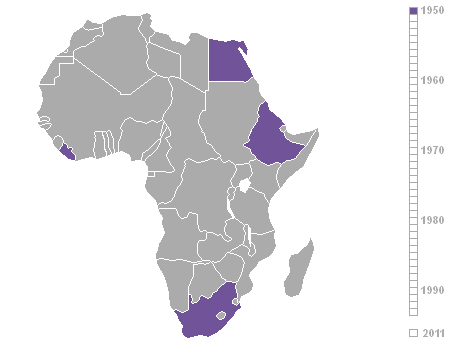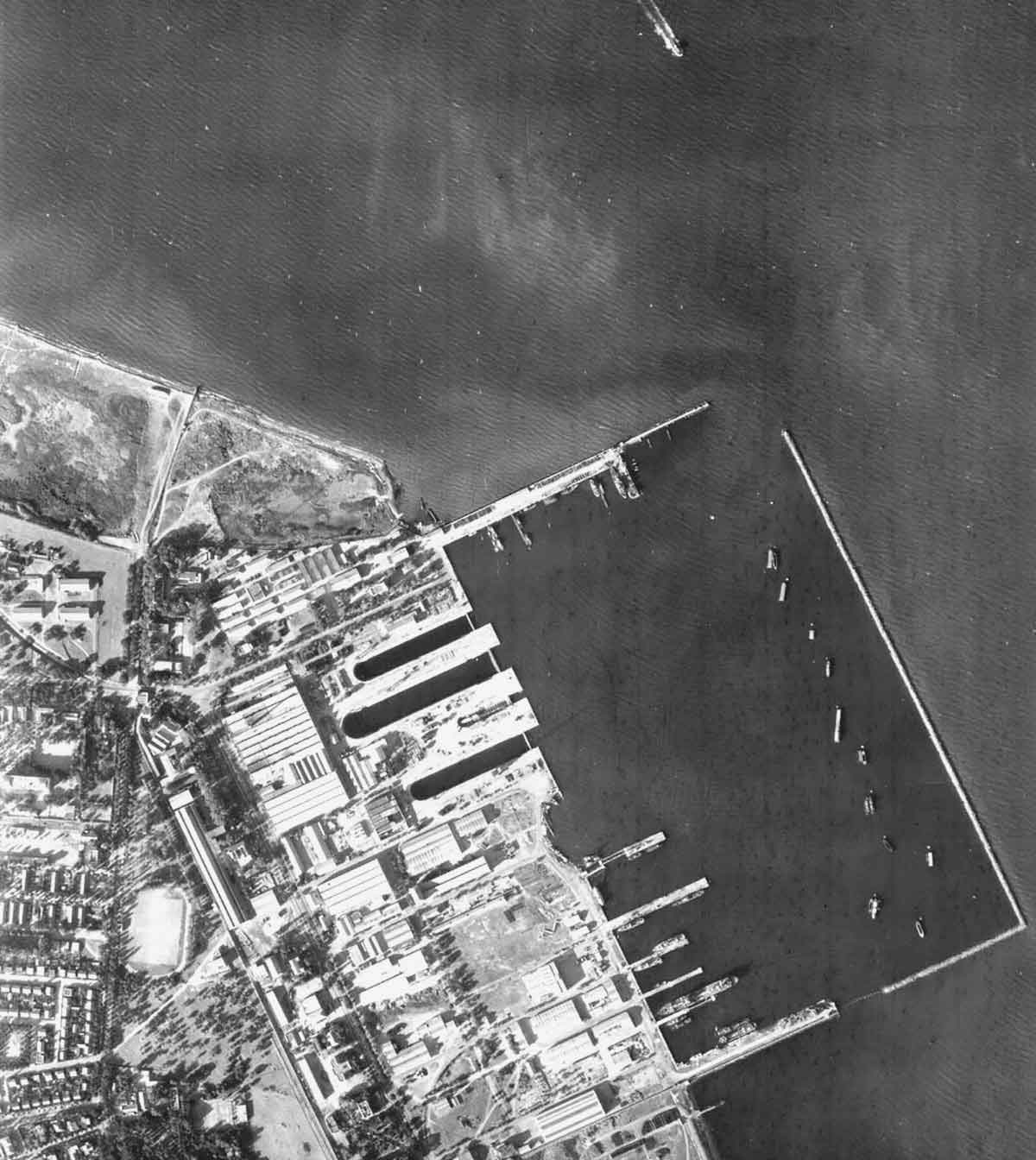|
Bizerte Crisis
The Bizerte crisis (; ) occurred in July 1961 when Tunisia imposed a blockade on the French naval base at Bizerte, Tunisia, hoping to force its evacuation. The crisis culminated in a three-day battle between French and Tunisian forces that left some 630 Tunisians and 24 French dead and eventually led to France ceding the city and naval base to Tunisia in 1963. Background After Tunisia gained independence from France in 1956, France remained in control of the city and its naval base, a strategic port on the Mediterranean, which played an important part in French operations during the Algerian War. France had promised to negotiate the future of the base, but had so far refused to remove it. Tunisia was further infuriated upon learning that France planned to expand the airbase. In 1961, Tunisian forces surrounded and blockaded the naval base in hopes of forcing France to abandon its last holdings in the country. After Tunisia warned France against any violations of Tunisian ... [...More Info...] [...Related Items...] OR: [Wikipedia] [Google] [Baidu] |
Decolonisation Of Africa
The decolonisation of Africa was a process that took place in the Scramble for Africa, mid-to-late 1950s to 1975 during the Cold War, with radical government changes on the continent as Colonialism, colonial governments made the transition to Sovereign state, independent states. The process was often marred with violence, political turmoil, widespread unrest, and organised revolts in both northern and sub-Saharan countries including the Algerian War in French Algeria, the Angolan War of Independence in Portuguese Angola, the Congo Crisis in the Belgian Congo, the Mau Mau Uprising in Kenya Colony, British Kenya, the Zanzibar Revolution in the Sultanate of Zanzibar, and the Nigerian Civil War in the secessionist state of Biafra. Background The "Scramble for Africa" between 1870 and 1914 was a significant period of European imperialism in Africa that ended with almost all of Africa, and its natural resources, being controlled as colonies by a small number of European states. Racin ... [...More Info...] [...Related Items...] OR: [Wikipedia] [Google] [Baidu] |
Menzel Bourguiba
Menzel Bourguiba ( ar, منزل بورقيبة, Manzil Būrgībah, lit=House of Bourguiba), formerly known as Ferryville, is a town located in the extreme north of Tunisia, about from Tunis, in the Bizerte Governorate. Toponymy The town's name translates as "House of Bourguiba", as it was named after the first president of independent Tunisia, Habib Bourguiba, in 1956. During the French protectorate of Tunisia (1881–1956), Menzel Bourguiba was named Ferryville, referring to contemporary French minister Jules Ferry and was nicknamed ''"Petit Paris"'' (Translated "Little Paris") by its inhabitants of French origin. In addition, it housed the arsenal of the French navy known as the Sidi-Abdallah, which was only handed over to the Tunisian authorities in 1962. Geography The town of Menzel Bourguiba is located about sixty kilometres north of Tunis and about twenty kilometres south of Bizerte, capital of the governorate of the same name. It is located in the south-west of t ... [...More Info...] [...Related Items...] OR: [Wikipedia] [Google] [Baidu] |
1961 In Tunisia
Events January * January 3 ** United States President Dwight D. Eisenhower announces that the United States has severed diplomatic and consular relations with Cuba (Cuba–United States relations are restored in 2015). ** Aero Flight 311 (Koivulahti air disaster): Douglas DC-3C OH-LCC of Finnish airline Aero crashes near Kvevlax (Koivulahti), on approach to Vaasa Airport in Finland, killing all 25 on board, due to pilot error: an investigation finds that the captain and first officer were both exhausted for lack of sleep, and had consumed excessive amounts of alcohol at the time of the crash. It remains the deadliest air disaster to occur in the country. * January 5 ** Italian sculptor Alfredo Fioravanti marches into the U.S. Consulate in Rome, and confesses that he was part of the team that forged the Etruscan terracotta warriors in the Metropolitan Museum of Art. ** After the 1960 military coup, General Cemal Gürsel forms the new government of Turkey (25th gov ... [...More Info...] [...Related Items...] OR: [Wikipedia] [Google] [Baidu] |
Wars Involving Tunisia
War is an intense armed conflict between states, governments, societies, or paramilitary groups such as mercenaries, insurgents, and militias. It is generally characterized by extreme violence, destruction, and mortality, using regular or irregular military forces. Warfare refers to the common activities and characteristics of types of war, or of wars in general. Total war is warfare that is not restricted to purely legitimate military targets, and can result in massive civilian or other non-combatant suffering and casualties. While some war studies scholars consider war a universal and ancestral aspect of human nature, others argue it is a result of specific socio-cultural, economic or ecological circumstances. Etymology The English word ''war'' derives from the 11th-century Old English words ''wyrre'' and ''werre'', from Old French ''werre'' (also ''guerre'' as in modern French), in turn from the Frankish *''werra'', ultimately deriving from the Proto-Germanic *''w ... [...More Info...] [...Related Items...] OR: [Wikipedia] [Google] [Baidu] |
Military Operations Involving France
A military, also known collectively as armed forces, is a heavily armed, highly organized force primarily intended for warfare. It is typically authorized and maintained by a sovereign state, with its members identifiable by their distinct military uniform. It may consist of one or more military branches such as an army, navy, air force, space force, marines, or coast guard. The main task of the military is usually defined as defence of the state and its interests against external armed threats. In broad usage, the terms ''armed forces'' and ''military'' are often treated as synonymous, although in technical usage a distinction is sometimes made in which a country's armed forces may include both its military and other paramilitary forces. There are various forms of irregular military forces, not belonging to a recognized state; though they share many attributes with regular military forces, they are less often referred to as simply ''military''. A nation's mili ... [...More Info...] [...Related Items...] OR: [Wikipedia] [Google] [Baidu] |
Conflicts In 1961
Conflict may refer to: Arts, entertainment, and media Films * ''Conflict'' (1921 film), an American silent film directed by Stuart Paton * ''Conflict'' (1936 film), an American boxing film starring John Wayne * ''Conflict'' (1937 film), a Swedish drama film directed by Per-Axel Branner * ''Conflict'' (1938 film), a French drama film directed by Léonide Moguy * ''Conflict'' (1945 film), an American suspense film starring Humphrey Bogart * ''Catholics: A Fable'' (1973 film), or ''The Conflict'', a film starring Martin Sheen * ''Judith'' (1966 film) or ''Conflict'', a film starring Sophia Loren * ''Samar'' (1999 film) or ''Conflict'', a 1999 Indian film by Shyam Benegal Games * ''Conflict'' (series), a 2002–2008 series of war games for the PS2, Xbox, and PC * ''Conflict'' (video game), a 1989 Nintendo Entertainment System war game * '' Conflict: Middle East Political Simulator'', a 1990 strategy computer game Literature and periodicals * ''Conflict'' (novel) ... [...More Info...] [...Related Items...] OR: [Wikipedia] [Google] [Baidu] |
Time (magazine)
''Time'' (stylized in all caps) is an American news magazine based in New York City. For nearly a century, it was published Weekly newspaper, weekly, but starting in March 2020 it transitioned to every other week. It was first published in New York City on March 3, 1923, and for many years it was run by its influential co-founder, Henry Luce. A European edition (''Time Europe'', formerly known as ''Time Atlantic'') is published in London and also covers the Middle East, Africa, and, since 2003, Latin America. An Asian edition (''Time Asia'') is based in Hong Kong. The South Pacific edition, which covers Australia, New Zealand, and the Pacific Islands, is based in Sydney. Since 2018, ''Time'' has been published by Time USA, LLC, owned by Marc Benioff, who acquired it from Meredith Corporation. History ''Time'' has been based in New York City since its first issue published on March 3, 1923, by Briton Hadden and Henry Luce. It was the first weekly news magazine in the United St ... [...More Info...] [...Related Items...] OR: [Wikipedia] [Google] [Baidu] |
Sakiet Sidi Youssef
Sakiet Sidi Youssef ( aeb, ساقية سيدي يوسف) is a town and commune in the Kef Governorate, Tunisia, near the border with Algeria. As of 2014, it had a population of 6,335. History In Roman times, the town was known as Naraggara. Roman historian Livy says that the Battle of Zama at the conclusion of the Second Punic War in 202 BCE took place near Naraggara.Simon Hornblower, Antony Spawforth, Esther Eidinow (editors), ''Oxford Classical Dictionary'' (Oxford University Press 2012, ) On 8 February 1958, it was bombarded by French forces in the belief that it was serving as a refuge for Algerian independence fighters. About 20 French bombers and fighters attacked causing at least 70 deaths and 13 ... [...More Info...] [...Related Items...] OR: [Wikipedia] [Google] [Baidu] |
The New York Times
''The New York Times'' (''the Times'', ''NYT'', or the Gray Lady) is a daily newspaper based in New York City with a worldwide readership reported in 2020 to comprise a declining 840,000 paid print subscribers, and a growing 6 million paid digital subscribers. It also is a producer of popular podcasts such as '' The Daily''. Founded in 1851 by Henry Jarvis Raymond and George Jones, it was initially published by Raymond, Jones & Company. The ''Times'' has won 132 Pulitzer Prizes, the most of any newspaper, and has long been regarded as a national "newspaper of record". For print it is ranked 18th in the world by circulation and 3rd in the U.S. The paper is owned by the New York Times Company, which is publicly traded. It has been governed by the Sulzberger family since 1896, through a dual-class share structure after its shares became publicly traded. A. G. Sulzberger, the paper's publisher and the company's chairman, is the fifth generation of the family to head the p ... [...More Info...] [...Related Items...] OR: [Wikipedia] [Google] [Baidu] |
United Nations
The United Nations (UN) is an intergovernmental organization whose stated purposes are to maintain international peace and security, develop friendly relations among nations, achieve international cooperation, and be a centre for harmonizing the actions of nations. It is the world's largest and most familiar international organization. The UN is headquartered on international territory in New York City, and has other main offices in Geneva, Nairobi, Vienna, and The Hague (home to the International Court of Justice). The UN was established after World War II with the aim of preventing future world wars, succeeding the League of Nations, which was characterized as ineffective. On 25 April 1945, 50 governments met in San Francisco for a conference and started drafting the UN Charter, which was adopted on 25 June 1945 and took effect on 24 October 1945, when the UN began operations. Pursuant to the Charter, the organization's objectives include maintaining internationa ... [...More Info...] [...Related Items...] OR: [Wikipedia] [Google] [Baidu] |
Monument Des Martyrs Bizerte
A monument is a type of structure that was explicitly created to commemorate a person or event, or which has become relevant to a social group as a part of their remembrance of historic times or cultural heritage, due to its artistic, historical, political, technical or architectural importance. Some of the first monuments were dolmens or menhirs, megalithic constructions built for religious or funerary purposes. Examples of monuments include statues, (war) memorials, historical buildings, archaeological sites, and cultural assets. If there is a public interest in its preservation, a monument can for example be listed as a UNESCO World Heritage Site. Etymology It is believed that the origin of the word "monument" comes from the Greek ''mnemosynon'' and the Latin ''moneo'', ''monere'', which means 'to remind', 'to advise' or 'to warn', however, it is also believed that the word monument originates from an Albanian word 'mani men' which in Albanian language means 'rememb ... [...More Info...] [...Related Items...] OR: [Wikipedia] [Google] [Baidu] |





.png)

